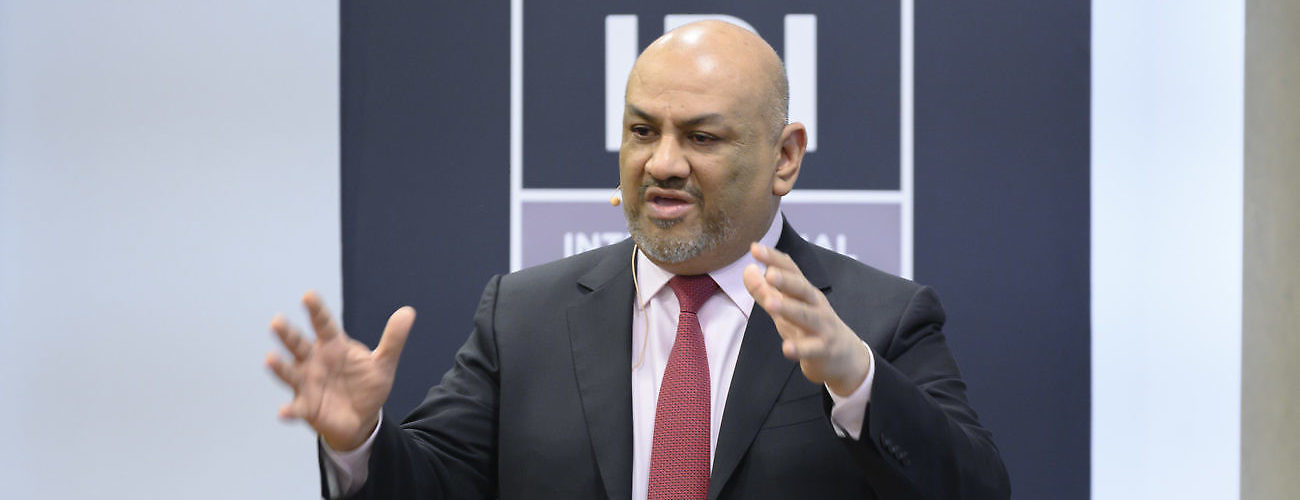Speaking at an IPI Global Leaders Series event on April 11th, Khaled H. Alyemany, the Minister of Foreign Affairs of Yemen, appealed for the implementation of the agreement reached in Stockholm in December that seeks to bring an end to a four- year civil war between the Yemeni government and Houthi rebels. The conflict has had a devastating effect on Yemen, with estimates that 80 percent of the population is in need of humanitarian assistance.
“If we lose this momentum we created in Stockholm,” Mr. Alyemany said, “we will go to another fresh round of conflicts that will go on for another four years.”
The Stockholm agreement was signed in the Swedish capital by the internationally recognized Yemeni government and the armed Houthi movement on December 18th, 2018 and called for activating a prisoner exchange, establishing ceasefires in the city of Hodeidah and the ports of Hodeidah, Salif and Ras Issa, and the formation of a joint committee on the city of Ta’iz, which would include civil society and the participation of the United Nations.
The UN Security Council swiftly endorsed the agreement in Resolution 2451, authorizing the Secretary-General to deploy a team to monitor compliance with the ceasefire, and this was followed on January 16th, 2019 with Resolution 2452, establishing a special political mission to support the Hodeidah agreement.
The accord on Hodeidah is the part of the agreement that has attracted the most attention. It called for an immediate ceasefire in the city and the ports of Hodeidah, a mutual deployment of forces from the city and the ports, including a handover of security responsibility to “local security forces”, and the establishment of a Redeployment Coordination Committee (RCC), chaired by the UN.
Mr. Alyemany said he considered the Hodeidah plan a “pilot project” in forging a Yemen-wide peace plan. “If we can agree to work together on Hodeidah, we can work together on Yemen,” he said and added that he could not contemplate the option of failure in Hodeidah because he considered it the “starting point” for the broader accord.
Mr. Alyemany, Yemen’s Permanent Representative to the UN before becoming Foreign Minister in 2018, said the agreement had initially prompted rare optimism about settling the conflict. “For the first time in the last four years of this conflict, in Stockholm we thought we arrived at implementable steps,” he said. “What has happened after four months?” he asked. “Nothing.”
He commended the UN for making “huge” efforts at peace making and said the Yemeni government fully supports the work of the UN envoy for Yemen, Martin Griffiths.
He placed the blame for the lack of progress on the Houthis, saying the government had tried to work with them but that they had not cooperated. “We never considered the Houthis as a terrorist organization so we are looking at them as partners,” he said. “They are being very nice when it comes to political talks and very ugly and rough when it comes to local commanders on the ground.”
He contended that the Houthis were controlled by Iran and benefited from the current chaos. They had failed to “take the agreement and work hard to step up the process of gaining trust and putting an end to his war,” he argued.
He said the government had not given up hope of implementing a ceasefire. “We cannot believe this momentum will collapse. We need to push hard for the Houthis to understand that this is the last moment of this war, and we need to wrap it up.”
In answer to an audience question about the involvement of Saudi Arabia in the war, he said, “We know that someone will say Saudi Arabia has a hegemon approach like Iran, but we never see that in Yemen… They came at the request of the President to help Yemenis reclaim their statehood.”
IPI Vice President Adam Lupel, moderating the discussion, asked whether the current peace process could bring in other armed actors and domestic groups. Mr. Alyemany replied, “We cannot fragment Yemen and bring in more ingredients.” Doing so, he said, would “open the Pandora’s box” and further complicate what he described as an already “messy” situation.
Dr. Lupel recalled that the National Dialogue Conference in Yemen had included a 30 percent quota for women’s participation and cited research showing that peace processes that include meaningful participation by women were more successful, both in coming to an agreement and in securing lasting peace. He asked how Yemen and the UN could capitalize on that experience and inject it into the current process.
“Yemeni women are much better and more capable of leading the country than men,” he said. “Men have contributed to the destruction of Yemen. I believe women can lead Yemen out of this war. If we gave women 30 percent in the national dialogue, why can’t we give that much of a share in our governance? Women need to be involved in leadership in Yemen, now, not tomorrow.”








